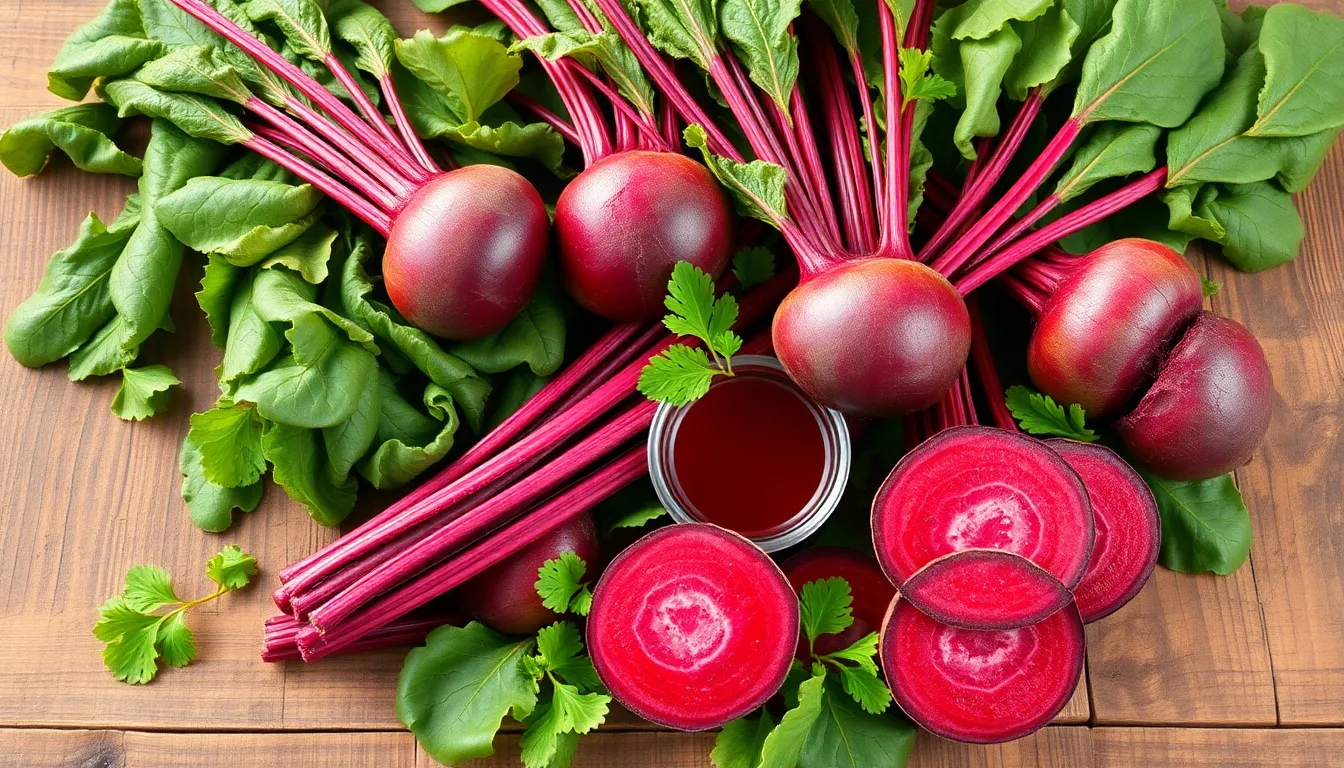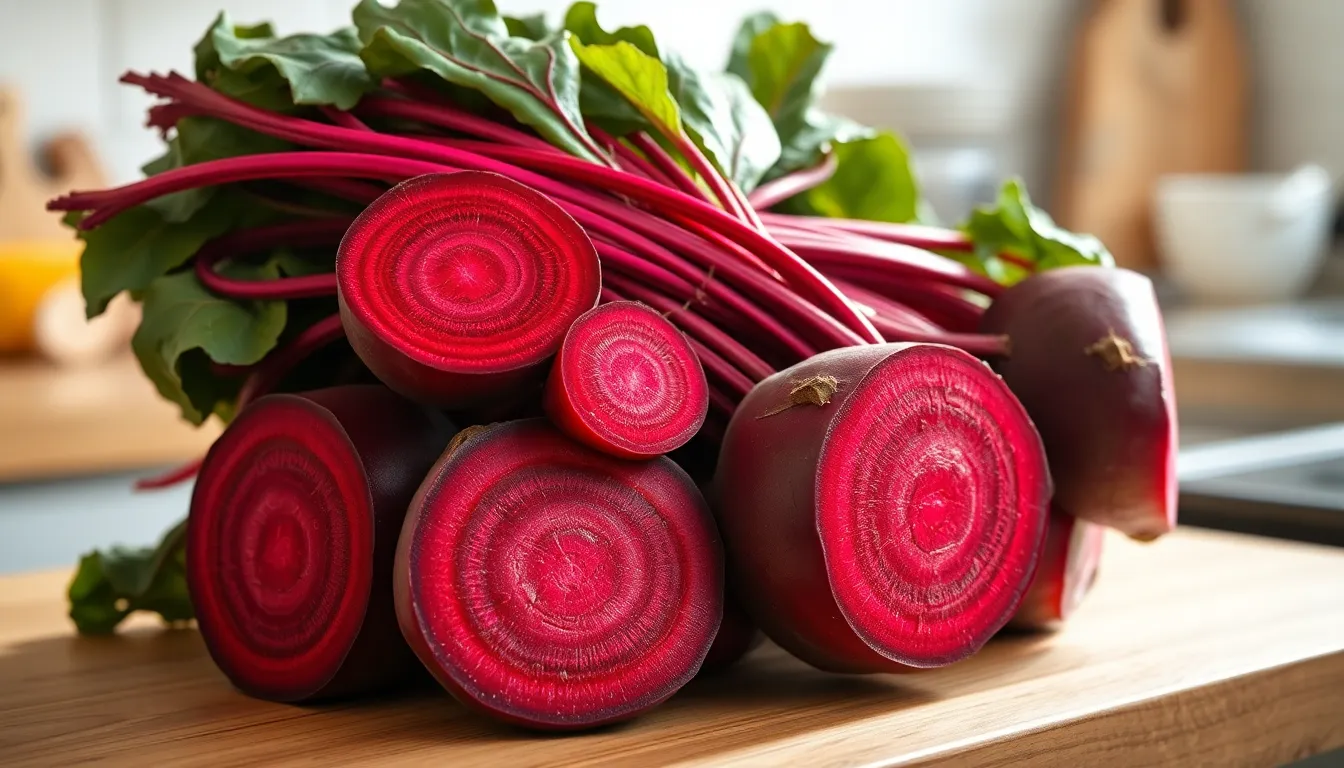Table of Contents
ToggleBeets have been gaining popularity in recent years, not just for their vibrant color but also for their impressive health benefits. Packed with essential nutrients and antioxidants, these root vegetables are more than just a colorful addition to salads. They offer a unique combination of vitamins, minerals, and dietary nitrates that can support overall health.
Many people wonder if beets are truly good for them. Research suggests that incorporating beets into a balanced diet can lead to various health improvements, from enhanced athletic performance to better heart health. As more individuals seek natural ways to boost their wellness, understanding the benefits of beets becomes increasingly important.
Nutritional Profile of Beets
Beets offer a rich nutritional profile, making them a valuable addition to any diet. They provide a variety of essential vitamins, minerals, and beneficial compounds that promote health.
Vitamins and Minerals
Beets contain significant amounts of vitamins and minerals. A single cup of cooked beets provides:
- Folate: 37% of the daily recommended intake, supporting DNA synthesis and cell division.
- Manganese: 22% of the daily recommended intake, essential for metabolism and bone formation.
- Potassium: 11% of the daily recommended intake, helping regulate blood pressure and muscle function.
- Vitamin C: 6% of the daily recommended intake, acting as an antioxidant and promoting skin health.
These nutrients contribute to overall wellness and play crucial roles in various bodily functions.
Antioxidants and Phytochemicals
Beets are rich in antioxidants and phytochemicals, which combat oxidative stress and inflammation. Key compounds include:
- Betalains: Provide the vibrant red color of beets and possess anti-inflammatory properties.
- Nitrates: Help improve blood flow and may enhance athletic performance.
- Vitamin C: Acts as a powerful antioxidant, protecting cells from damage.
These compounds may improve health outcomes, making beets an excellent choice for a nutritious diet.
Health Benefits of Beets

Beets offer numerous health advantages that contribute to overall well-being. Their nutrient-rich profile positively impacts various bodily functions.
Heart Health
Beets promote heart health due to their high content of dietary nitrates. These compounds can lower blood pressure, improve blood flow, and enhance arterial function. A study published in the journal Hypertension found that individuals consuming beet juice experienced significant reductions in blood pressure levels. The potassium in beets also supports heart function by regulating fluid balance and reducing strain on blood vessels.
Improved Digestion
Beets are an excellent source of dietary fiber, which aids in digestion and promotes gut health. Fiber helps maintain bowel regularity and prevents constipation. The presence of betaine also supports liver function, contributing to efficient digestion and nutrient absorption. Additionally, the high water content in beets assists in maintaining hydration, essential for optimal digestive processes.
Enhanced Athletic Performance
Beets can enhance athletic performance through their ability to increase stamina and reduce fatigue. Research in the Journal of Applied Physiology indicates that dietary nitrates found in beets improve oxygen efficiency and endurance during physical activity. Consuming beet juice before exercise can lead to improved performance outcomes in activities requiring sustained energy, such as running or cycling.
Potential Risks and Considerations
While beets offer numerous health benefits, certain risks and considerations are essential to acknowledge.
Oxalates in Beets
Oxalates, found in beets, can contribute to kidney stone formation, particularly in susceptible individuals. High oxalate intake may lead to calcium oxalate stones, which are the most common type of kidney stones. Those with a history of kidney stones or related issues should monitor their beet consumption and consult a healthcare professional if necessary.
Allergic Reactions
Allergic reactions to beets, although rare, can occur. Symptoms might include itching, hives, or swelling. Individuals with a known sensitivity to beets or related plants, such as chard or spinach, should avoid them to prevent potential allergic responses. Consulting a doctor upon experiencing any adverse reactions after consuming beets is advisable.
How to Incorporate Beets into Your Diet
Incorporating beets into daily meals is simple and offers diverse health benefits. Here are some effective methods to enjoy this nutritious root vegetable.
Cooking Methods
- Roasting
Roasting beets enhances their natural sweetness. Wrap them in foil, place them on a baking sheet, and roast at 400°F for about 45-60 minutes until tender.
- Boiling
Boiling is quick and preserves the beets’ vibrant color. Cook whole beets in water for 30-40 minutes or until fork-tender, then peel and slice.
- Steaming
Steaming beets retains more nutrients compared to boiling. Steam peeled and chopped beets for 15-20 minutes to achieve a tender texture.
- Juicing
Juicing fresh beets provides a concentrated source of nutrients. Combine beets with other fruits and vegetables, like carrots or apples, for added flavor.
- Pickling
Pickling adds a tangy twist to cooked beets. Slice cooked beets and soak them in a mixture of vinegar, sugar, and spices for several hours or overnight.
Recipe Ideas
- Beet Salad
Toss roasted or boiled beets with arugula, goat cheese, and walnuts for a hearty salad. Dress with olive oil and balsamic vinegar for extra flavor.
- Beet Hummus
Blend cooked beets with chickpeas, tahini, lemon juice, garlic, and olive oil for a vibrant dip. Serve with pita or vegetable sticks.
- Beet Smoothie
Combine raw beet cubes, banana, spinach, and almond milk in a blender for a nutritious smoothie. This option boosts energy levels and adds a beautiful color.
- Beet Soup
Cook diced beets, onion, and garlic in vegetable broth. Blend until smooth, season with salt and pepper, and garnish with yogurt or sour cream.
- Beet Burger
Combine cooked beets with black beans, oats, and spices to create healthy veggie burgers. Grill or pan-fry until crispy and serve on a whole grain bun.
Beets stand out as a powerhouse of nutrition and health benefits. Their rich profile of vitamins minerals and antioxidants makes them a smart choice for anyone looking to enhance their diet. With potential improvements in heart health athletic performance and digestion beets offer a multitude of advantages that are hard to ignore.
While there are some considerations regarding oxalates and allergies it’s clear that for most people beets can be a delicious and beneficial addition to meals. With various cooking methods and recipes available incorporating beets into daily life has never been easier. Embracing this vibrant vegetable can lead to a healthier lifestyle and a more colorful plate.







